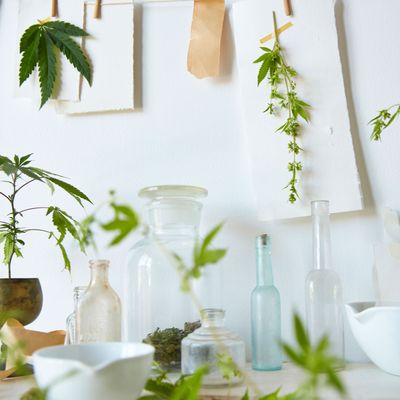
The cannabidiol tincture I drop under my tongue tastes a little bit like mint chocolate, with the unmistakable slip of coconut oil. Within minutes, I feel a little foggy and a little cozy, and all I want to do is watch The Great British Bake Off or perhaps do some crosswords. I’ve taken too much on occasion, and it gives me a shaky feeling similar to smoking pot, but if I take just a few drops, I feel delightful. Maybe a little too delightful judging by the emails I’ve sent people I care about, but it’s a small trade-off for me. (Sorry, everyone.)
Cannabidiol, or CBD, is a chemical found in marijuana, the yin to THC’s yang; theoretically, it’s not psychoactive, i.e., it doesn’t make you feel high in the same way as ingesting a high-THC strain of weed. People use it for everything from epilepsy to pain relief and anxiety, which was my main point of interest. CBD derived from hemp is legal in New York State, and it’s available at your local head shop or the obscure drug store; I bought mine online from a sleek lifestyle site that offers DIY salve recipes and hemp oils specifically for pets.
Anxiety, obsessive-compulsive disorder, and depression have followed me like a cloud since I was a child. The relief I found in little pre-Prozac-era pills can’t be overstated; I can’t imagine what my life would have been like — would be like — without antidepressants. But the thing with medication is that, for me, it’s merely another tool in an arsenal that includes talk therapy, meditation, acupuncture, aerial yoga (yes, really), and other more holistic treatments.
The popular benzodiazepine Klonopin has been my go-to for daily anxiety maintenance and panic attacks since I was 19. It makes me sleepy and dopey, and, as any Valley of the Dolls fan will tell you, benzos are highly addictive. As soon as I heard about CBD, my interest was piqued, but a quick Google will turn up many more sites extolling the virtues of the drug (and selling it) than any hard-and-fast data about how it works.
I turned to Dr. Margaret Haney, professor of Neurobiology and Psychiatry at Columbia University Medical Center for more information about CBD. “It’s a drug that seems to act at a wide range of brain sites,” she said, “so in terms of anxiety, one of its potential mechanisms could be acting at one of the serotonin receptors, so as you know, anxiety medications and antidepressants are often acting at the serotonin system. SSRI is [short for] selective serotonin reuptake inhibitor. So, that’s potentially one mechanism for CBD to affect anxiety, but again, we don’t know.”
Marijuana, along with heroin, LSD, and MDMA, is still a Schedule 1 drug, which makes it very difficult to study the same way you would, say, the next cash-cow SSRI. Haney explained, “You would really want to study CBD as compared to [a] placebo and measures of anxiety,” she said, adding, “There have been a handful of studies giving CBD orally and looking at measures of anxiety, and there seems to be a suggestion that it has some anxiolytic effects — some effects that decrease anxiety — but in terms of comparing to FDA-approved anxiolytics or, you know, really assessing what daily use of cannabidiol for anxiety is, there is very little data.
“As with most things in the marijuana field, society has jumped far, far ahead of the science. We still have a lot to do with cannabidiol, and so, again, to comment on whether it’s safe to combine with other medications or to compare to FDA-approved medications, we just don’t have any data really on that.”
Dr. Julie Holland is one of the few psychopharmacologists to study and write about the use of marijuana as an adjunct or alternative to psych meds. Holland, who is the author of Weekends at Bellevue, Moody Bitches, Ecstasy: The Complete Guide, and The Pot Book, offered me more information on the possible pros and cons of using CBD in lieu of Klonopin or similar drugs. They “can help with anxiety but can make you less sharp cognitively … a little fuzzy, with memory problems or sedation.” (Perhaps this explains why I can never find my keys, or my phone, or my Metrocard.) “Benzos have risk of tolerance and withdrawal and [they’re] dangerous to mix with alcohol. CBD doesn’t seem to have these issues.”
As Holland pointed out, “No one has done these sorts of drug-interaction studies, but my guess is that you could. I certainly have patients mixing cannabis and SSRIs.” Before I embarked on my little science experiment, I ran the idea by my own meds doc, who more or less gave me the go-ahead. While I didn’t ask, anecdotal data — i.e., me and my friends — suggests that Holland’s patients aren’t the only people mixing pot and antidepressants.
While I tinker with my meds with help from my own psychopharm, looking for the ideal dose and balance that won’t tip me into an insomniac mess or a snoozy lump on my couch, CBD is, at the very least, an interesting way to spend a few hours chilling out without getting the munchies or spinning out in my own brain. It’s definitely not a magic bullet, and I wouldn’t use it if I were in crisis or about to get on an airplane, but I’m glad I found it. I look forward to the day I can use high-quality CBD derived from marijuana whenever I want.




